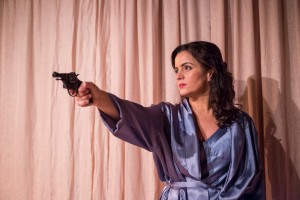From the start, the play feels taut with tension. The characters circle the space like caged animals, about to embark on a fight of epic proportions. Paulina is married to a human rights lawyer, Gerardo, in a country that is changing from dictatorship to democracy. Paulina has suffered under the regime and is a torture victim who has never come to terms with her incarceration.
She awaits her husband’s return anxiously. He arrives in a stranger’s car who has stopped to help him when he had a flat tyre. The stranger is Dr Miranda. Paulina is convinced that she recognises Dr Miranda’s voice as the man who systematically tortured and raped her. What unfolds is a trial in their own home. This throws up a number of moral questions to do with justice and revenge.
Lisa Zahra as Paulina gives an assured performance. This is a woman who has kept the secret of her captivity locked inside herself. The appearance of Dr Miranda gives her a chance to lay the ghosts to rest. Vinta Morgan as Gerardo manages to be confused and indignant when confronted by a revenge that cannot be halted. Dr Miranda played by Pradeep Jey tries to portray a wronged innocent man. Ariel Dorfman wrote the play with the intention that there should be more ambiguity and doubt as to whether Miranda is in fact the torturer. In this version, there seems to be no doubt from the beginning that he was guilty. It’s very hard for the audience to actually feel sympathy for any of the characters because they are all very two dimensional and detached.
Amy Jane Cooke’s set serves the show well. The whole space is curtained off with covers over the chairs giving the feel of a mausoleum or funeral parlour, although the pink colour seems at odds with the overall feel. Dan Lawrence gives us a haunting and eerie soundtrack from Paulina’s days of torture. The lighting design from Ciaran Cunningham helps to create tension with flickering strip lights. Miranda makes the lights flicker every time he is near them. This seems to signal once again that he is the man who used electricity to torture his victims. With the audience on either side, it should make the whole performance very intimate and uneasy, but the production fails in this respect because of the lack of doubt as to who is in the right.
The overall effect is that it is Paulina who is justified in putting this man on trial. She is clear about his identity and so are we as all the pointers of sound and lighting make it easy to decide. There is no doubting that this play that was written in 1990 has as much resonance today as when it was written, but there needed to more uncertainty as to whether Paulina was just a paranoid victim and the possibility that the Dr was innocent.
Runs until 10th November.
What makes Arts Scene in Wales special:

